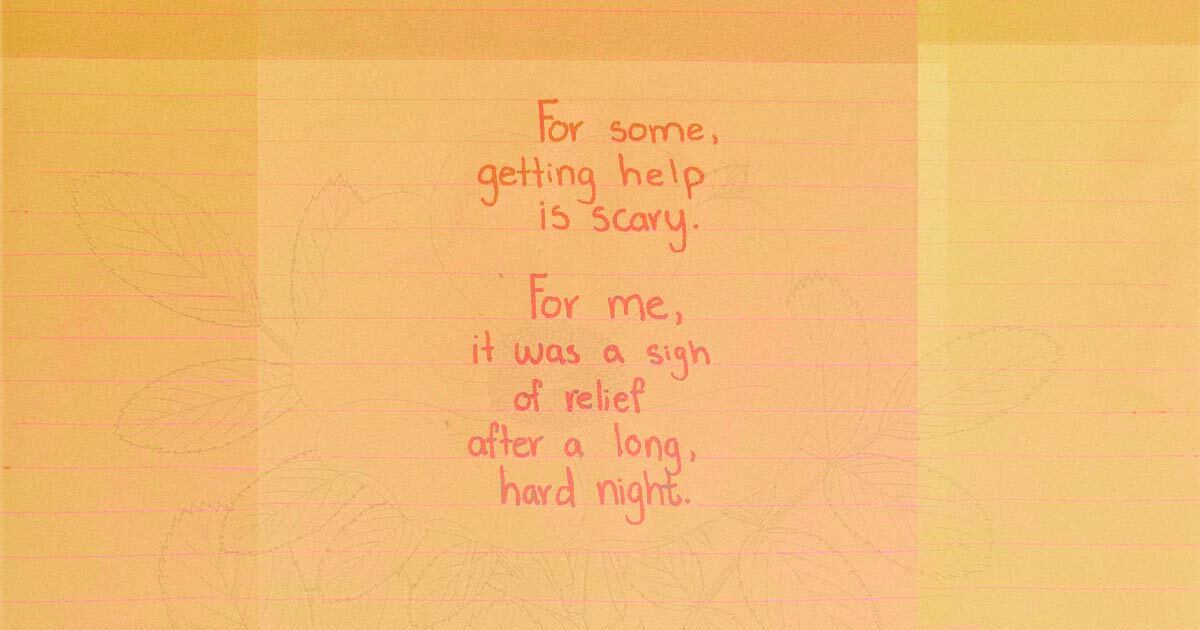Some of you might know the exact moment you “broke.” Maybe, for you, the world split into a “before” and “after.” Maybe, a diagnosis felt like the ending of something significant and the beginning of something else. Maybe the darkness came in one shocking moment or a series of moments that would define you forever.
This experience, the experience of becoming mentally ill at a distinct point in time is a valid one and one I empathize with. But it is not my story.
There are many of us out there living in the shadows, the ones who are sick and don’t even know it. The ones who don’t recognize the illness because, for us, the illness is the constant and always has been.
I grew up in the rural hills of South Dakota, and for me, the blight of mental illness started when I was barely cognizant. I remember sitting on the steps of my home as a toddler with juice all down my front, wondering why I was dumb enough to have spilled it. There was another time when, as a kindergartener, I was on the playground with some friends and I had the heavy and intense thought that nobody liked me.
I know these thoughts now to be a part of one of my many diagnoses—Major Depressive Disorder. But back then, I just thought it was me.
I thought I was broken somehow and there was no fixing it.
These self-hating thoughts would haunt me all through elementary, middle, and high school. They morphed into something even uglier as they began to show on my body in the forms of self-harm and anorexia. They showed themselves in my relationships with friends and partners who treated me poorly. They showed themselves in the way I would cry myself to sleep every night, listening to sad songs on my purple iPod as I wished for death to claim me.
For me, mental illness was the rule and not the exception. It was my beginning, middle, and end.
I tried to get help when I was a teenager after scoring alarmingly high on a self-assessment for depression. I showed the results to my dad and was met with nothing but indifference. I tried again when I showed my mom the horizontal marks that had taken up residence on my arm, but instead of taking me to get treatment, she screamed angrily. The third and final time I tried to get into therapy was when I enlisted the help of a youth pastor. He ended up telling my parents it was just a phase and told me not to be so harsh on them.

Later in life, I met my husband and moved away from my neglectful and abusive childhood home.
A turning point came when I was driving my car for the first time in my new, unfamiliar town. I had what I can now identify as a panic attack. I immediately turned back around and called my husband, crying and screaming that I didn’t think I could do it anymore.
My husband called his mom, whom I didn’t know very well at the time, to come and sit with me. I remember that day very clearly. We were sitting on the staircase, tears drying on my face when she told me that it was OK to get help. Shortly after that, I was sitting across from a doctor and prescribed my first anti-depressants and anti-anxiety medications.
That day and that doctor started me on my journey toward mental well-being. It led me to accurate diagnoses, a therapist, and a team of medical professionals that help me live life to the best of my abilities.
For some, getting help is scary. For me, it was a sigh of relief after a long, hard night. It was pressure lifting off my shoulders after carrying hundreds of pounds of emotional weight for countless miles. It was the relief of knowing that it wasn’t my fault, that I wasn’t a broken thing to be discarded and thrown away. I was simply sick. And when you’re sick, you can get better.
I’ve come a long way since that little girl on the playground or the young woman on the staircase. I now work in the mental health field helping others like me find healing every single day. If you feel like it will never get better, know that it can. If you feel like nobody will believe you, know that someone, someday, will.
You are not weak for wanting or needing support. If you’re seeking professional help, we encourage you to use TWLOHA’s FIND HELP Tool. If you reside outside of the US, please browse our growing International Resources database. You can also text TWLOHA to 741741 to be connected for free, 24/7 to a trained Crisis Text Line counselor. If it’s encouragement or a listening ear that you need, email our team at [email protected].
Rick
God bless you
Frank
thank you for sharing your story <3
Anna
This could be my story.
ansh
Mental health is crucial for our well-being. Taking time for self-care, talking openly, and seeking support when we needed it. Let’s promote understanding and care to break the stigma. Everyone’s journey is unique, and kindness goes a long way in supporting mental health. If you have to know more about it. You can visit this site. https://yourmentalhealthpal.com/mental-health-benefits-of-vitamin-d/
Swenja
Hello dear Hailey,
I am currently writing my bachelor’s thesis in visual communications and have decided to bring more attention to the topic of self-harm.
During my research, I came across your blog post on TWLOHA and I would like to incorporate part of it into my bachelor’s thesis – of course, only with your permission.
If you are willing to support me with this, just reach out to me via e-mail ([email protected]) and I’ll provide you with some more detailed information.
Thanks in advance